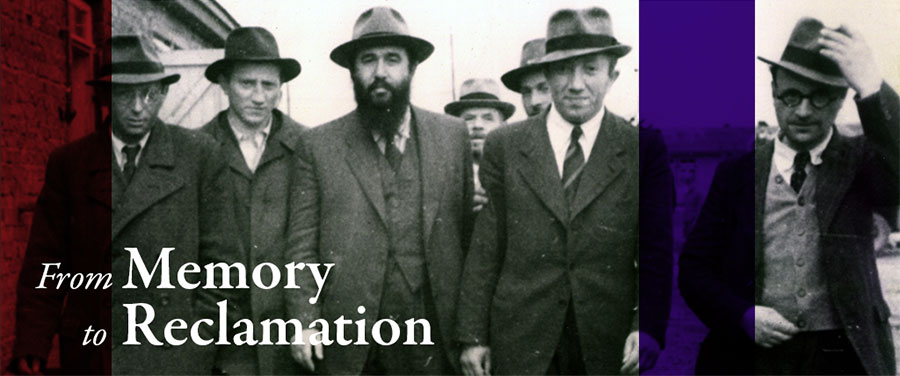The dramatic and miraculous escape of 300 Mir yeshiva boys to Shanghai, China during the Holocaust was remembered by more than 10,000 people in 90 venues around the globe during the recent sefirah period. “Shanghai Miracle,” the first of the Yizkereim series of Holocaust documentary films, inspired audiences from Austin, Texas to British Columbia, from England to Israel and from Lakewood to Los Angeles. Wearing black hats, baseball caps, long frocks and knitted kippot, they sat with eyes glued to the screens in Young Israels, Agudahs, Kollels, shtiebels, senior centers, and community synagogues on four continents.
Documenting the Holocaust with stories of resistance that culminated in the post-Churban renaissance of Torah around the world, “Yizkereim: Remember Them” is the rallying call for this initiative, jointly sponsored by Torah Umesorah’s Zechor Yemos Olam and the Rabbi Leib Geliebter Memorial Foundation. “Sefirah was chosen specifically for the launch of Yizkereim because it is a time of communal mourning commemorating the many different tragedies that Klal Yisrael suffered during this time period,” said Dr. Joseph Geliebter, executive producer of the series and director of the Rabbi Leib Geliebter Memorial Foundation. “I saw tremendous S’yata D’Shmaya in the success of this program. From the overwhelming turnout at the first showing in Teaneck — with less than five days advance notice — to venue after venue of capacity crowds, this program elicited an unprecedented response. I attribute this to the six million kedoshim who are crying out to be remembered.”
A miracle is defined as an extraordinary event that surpasses all known human or natural powers and is ascribed to a supernatural cause, the work of G-d. Such was the case with the happenings in Shanghai and the film brought this story to life. “Shanghai Miracle” chronicled the wartime experiences of students from the Mir Yeshiva, as well as those from Chachmei Lublin, Telshe, Lubavitch and Kaminetz, who made their way to China, averting the fate of those who remained in Europe. Documentary footage was interspersed with interviews featuring survivors who recalled the gentiles who jeopardized their careers and risked their lives; the long trek by train and boat; the Torah study that sustained them in a strange country; the many leaders that emerged and ultimately re-established their yeshivos and passed on their mesorah.
The film compares the salvation of these yeshiva students to the sparing of the ancient city of Yavne and its Torah scholars, as requested by Rabbi Yochanan ben Zakkai during the siege of Jerusalem by the Roman army. Just as that act led to the rebirth of Torah for later generations, the students who escaped to Shanghai rebuilt Torah institutions around the globe after World War II.
“We all feel it is very important to share this part of our history so people will hear and see the nisim v’niflaos surrounding the Mir experience,” said Larry Kraut of Young Israel of Fair Lawn.
Rabbi Dovid Weinberger, Morah D’Asra of Congregation Shaaray Tefilah in Lawrence, NY, who encouraged Yizkereim project organizers to show the films in community shuls, said “the video’s timeless message for young and old alike is all about emunah, bitachon and hashgacha pratis. Hearing the details of this story from real people who lived through that period and described how it shaped their lives for the future was informative, enlightening and inspiring all at the same time. We lost millions during the Holocaust, and when you think of the few hundred boys who were saved, it seems miniscule but thousands of neshamos are here today because of those 300 boys.”
“Shanghai Miracle” was the first-ever film to be presented through the Torah Conferencing Network (TCN). Morris Smith, founder and head of TCN, which presents Torah classes, or shiurim, to audiences around the world via videoconferencing said, “The film dealt with a topic that is required viewing by all audiences as we perpetuate the memory of the kedoshim. Shuls throughout the network attracted standing-room only crowds, and the feedback was extremely positive.”
According to Debby Spero, guide at Yad Vashem in Jerusalem, “Although many people know of this remarkable story, I don’t believe that too many understood that an entire series of miracles and sacrifices had to come together in order to facilitate this salvation of Torah Jewry. The Yizkereim project has brought this all to light — a true pirsumma d’nissa.”
“In addition,” Spero continued, “I often wonder if today’s Torah World expresses enough hakaras hatov to this great man and righteous gentile, the Japanese spy, Sugihara, for being G-d’s personal messenger. If the tables were turned, how many of us would have risked our own lives and the lives of our children to do what Sugihara did? This film affords Sugihara the recognition that he so truly deserves among the third and fourth generations of Torah Jews who are all the direct beneficiaries of his greatness.”
Rochel Manela, an attendee at the Young Israel of Los Angeles, said the “film truly explained the developments that led to the saving of the yeshiva students and the unbelievable sequence of events that clearly showed G-d’s intervention.”
“The last remnants of the victims’ families who survived the Holocaust to tell their stories have lived with the burden of remembrance. These survivors, the she’eris hapleitah, are now passing the torch to the next generations,” said Dr. Joseph Geliebter. “They are urging us to remember the families and communities that were destroyed and the pre-war life that was decimated. It is the last wish of these aging survivors that this legacy be guarded and transmitted, and it is the goal of our film series to carry out their wish.”
The next installment of the Yizkereim film series, “Sh’eiris Hapleitah,” will be presented in community shuls worldwide during the “three weeks.” This original documentary presents the inspirational story of the concentration camps survivors, their liberation and early existence in the Displaced Persons camps. The film focuses on their tremendous resilience and determination to rebuild their shattered lives and re-kindle Yiddishkeit and Torah life.
Originally developed for distribution in high schools where tens of thousands of students viewed the videos annually on Asara B’Teves, the film series was initiated and overseen by Rabbi Joseph Elias, the founder of Zechor Yemos Olam division of Torah Umesorah. The current Yizkeriem program was co-produced by the Rabbi Leib Geliebter Memorial Foundation, Dr. Joseph Geliebter, director and Torah Umesorah, Rabbi Dovid Nojowitz, national director; Zechor Yemos Olam division, Rabbi Sholom Friedman, director; and directed by David Lenik of Better World Productions.
For more information contact: info@yizkereim.com.



